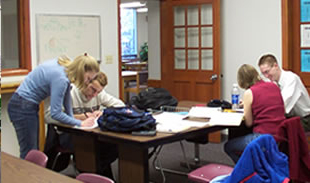Students participating in a voluntary peer tutoring program at NAU are not only getting better grades, they’re setting themselves up for future academic success.
Developed to help students understand difficult course content, the supplemental instruction program also teaches students how to study effectively for individual subjects such as chemistry or psychology.
“The program is not just about the material and help in one course, it’s about becoming a better student and doing better in all courses,” said Brandon Cruickshank, director of class-linked academic support and professor of chemistry and biochemistry. “I think students recognize the value of that.”
As university students occasionally fall under criticism for not attending classes and doing the minimal amount of work, NAU’s supplementary study sessions are seeing an increase in participation. Twenty percent of students with access to the program attended three or more sessions in 2009-10.
The program has expanded dramatically during the last two years, supporting 37 science, psychology, engineering, business and math courses in 2009-10. Four rooms in the du Bois Center have been designated for supplemental instruction use in the fall.
The expansion will continue incrementally as the program identifies courses where students struggle, with the focus of improving student success and retention, Cruickshank said.
“Students who attend supplemental instruction sessions succeed at a much higher rate than those who do not,” Cruickshank added. “We want first-year students to have that extra support to excel here at NAU.”
The numbers prove success with 85 percent of participants earning A’s, B’s, or C’s compared to 72 percent of non-participants, and only 15 percent of participants receiving a Drop, Fail or Withdrawl compared to 28 percent for non-participants.
Aaron Tabor, a supplemental instructor and coordinator, discovered a passion for the program as an undergraduate using the resource in entry-level science classes. He needed both the grade and the understanding in basic biology to reach his goal of attending medical school.
“Supplemental instruction is not designed to re-teach the lecture,” Tabor said. “We want to help students figure out how to learn the material, whether that entails putting it in terms students can understand or teaching effective study habits.”
Now a graduate student, Tabor credits his success to the program and became involved to continue making a difference for NAU students. “Because I took so much from the program, it truly did get me A’s, I wanted to give back to it,” he said.



